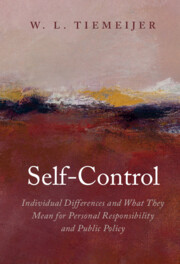 Self-Control
Self-Control Book contents
- Self-Control
- Self-Control
- Copyright page
- Dedication
- Epigraph
- Contents
- Figures
- Tables
- Acknowledgments
- 1 Introduction
- Part I Self-Control
- Part II Implications for Society and Politics
- 7 The Ever-Growing Importance of Self-Control
- 8 Self-Control and Moral Responsibility
- 9 Who Should Get What?
- 10 Conclusion: What Is to Be Done
- Notes
- Bibliography
- Index
10 - Conclusion: What Is to Be Done
from Part II - Implications for Society and Politics
Published online by Cambridge University Press: 20 August 2022
- Self-Control
- Self-Control
- Copyright page
- Dedication
- Epigraph
- Contents
- Figures
- Tables
- Acknowledgments
- 1 Introduction
- Part I Self-Control
- Part II Implications for Society and Politics
- 7 The Ever-Growing Importance of Self-Control
- 8 Self-Control and Moral Responsibility
- 9 Who Should Get What?
- 10 Conclusion: What Is to Be Done
- Notes
- Bibliography
- Index
Summary
The last chapter summarizes the book’s main findings and advances three policy recommendations, two of which transcend the issue of self-control and apply to politics and government more generally: • Behavioral science must have a much stronger position at the policymaking table. The current practice of installing “Behavioral Insight Teams” by governments around the world does not go nearly far enough, and can even be seen as an obstacle to real change. • The need for considering three epistemological standpoints (see Chapter 8) means that our “regulatory condition” is one of imperfection and brokenness. We need more room for what Aristotle called epieikeia: the rectification of the law as an expression of the highest form of justice. One of the reasons for epieikeia may be limited self-control. • Due to both the long-term social changes discussed in Chapter 7, the demands of self-control have become too exacting for substantial parts of the population. The book’s final and most urgent conclusion is that prevailing political views and public policies are based on beliefs about self-control that are simply false. A more fair and just society requires a relaxation of these views and policies.
- Type
- Chapter
- Information
- Self-ControlIndividual Differences and What They Mean for Personal Responsibility and Public Policy, pp. 238 - 263Publisher: Cambridge University PressPrint publication year: 2022


